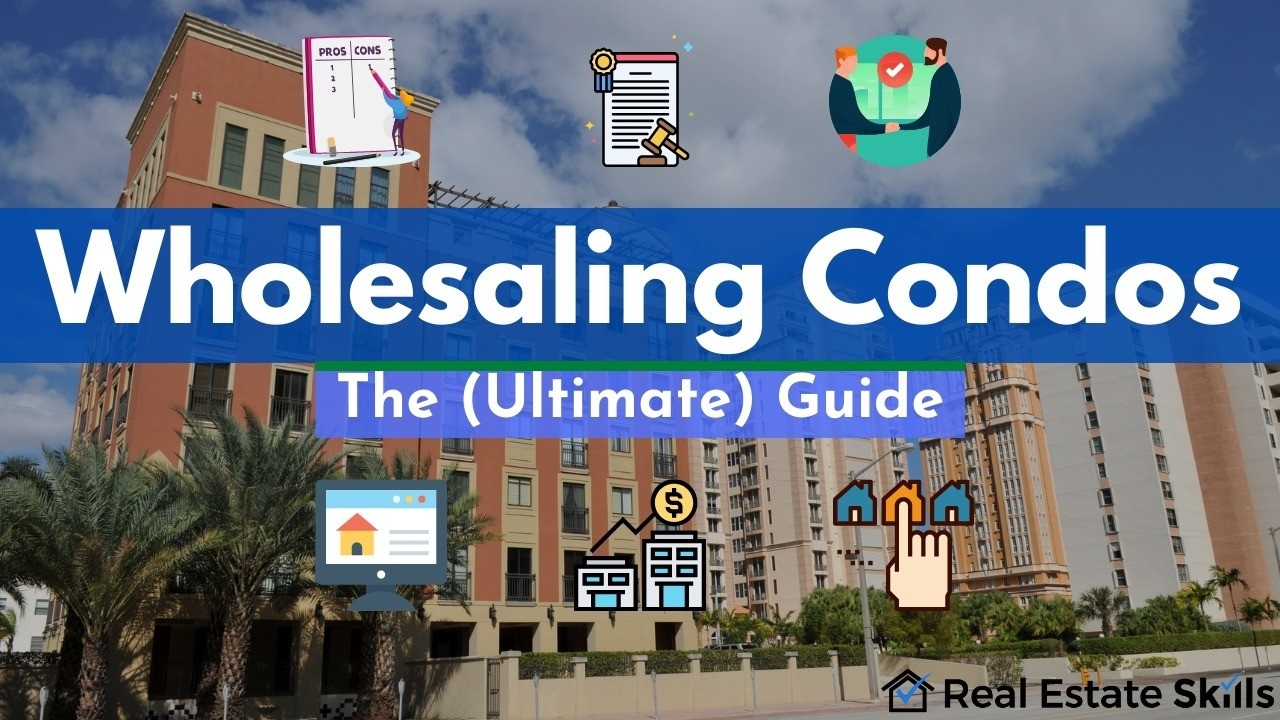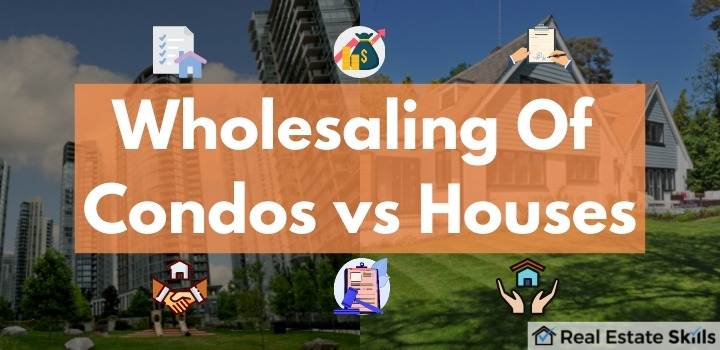
Wholesaling Condos: The (Ultimate) Guide
Jul 05, 2022Wholesaling real estate is an investment strategy that has been incredibly popular lately as it fits hand-in-glove with a seller’s market, characterized by rising home values, strong demand, and low inventory.
If you live in a neighborhood or real estate market where condominiums are mainstream investments, wholesaling real estate is still a viable investment strategy. However, there are a few wrinkles in the wholesale condo process that differ from wholesaling single-family or multi-unit wholesale properties.
The narrative that follows clarifies how to avoid potential pitfalls when wholesaling condominiums that may impede a wholesale transaction as it moves towards completion.
- What Is Wholesaling Condos?
- Can You Wholesale A Condo?
- Is It Possible To Wholesale A Condo In A HOA?
- Wholesaling Condos: Pros And Cons
- Are Condos Good For Flipping Contracts?
- Wholesaling Of Condos vs Houses
- Final Thoughts On Wholesaling Condos
What Is Wholesaling Condos?
The simplest way to understand the concept of condo wholesaling is to break down each component within the investment strategy.
What Is Wholesaling?
Real estate wholesaling is an investment strategy in which a real estate investor identifies properties below market value and, sometimes, non-MLS listed. There are various reasons why a potential investment property may be priced below its true market value. For instance, the seller may be facing foreclosure, an impending divorce, or other personal reasons which may never become apparent.
When a wholesaler executes a contract of sale for the purchase of real estate, they simultaneously receive the legal right/obligation to purchase the property at a price within a defined period. The Principle of Equitable Conversion awards the buyer (aka, the wholesaler) - equitable interest – a marketable asset that can be assigned to another buyer for a profit - before the first deal even closes.
The legal instrument that is used to accomplish this is known as an Assignment of Contract.
A wholesaler typically sells to a cash buyer, interested in a property to rehab. The fix and flipper can then resell it to a retail customer. Many renovation specialists prefer not to engage in what can be a lengthy negotiation with a seller, so they prefer to find a discounted property from a wholesaler – whose skills bridge the gap between a motivated seller and the fix and flipper.
What’s the Wholesaler’s gross profit? The difference between the original and subsequent contract price. For more on wholesalers’ income potential, see Wholesale Real Estate Salary: How Much Can You Make Wholesaling?
What Is A Condominium?
A condominium is a defined legal entity governed and guided by the rules delineated in the project’s original prospectus, bylaws, and subsequent amendments to these defined rules. Condominiums, more often called condos, are a type of real estate ownership that generally includes private residential units contained within a project that share (and collectively maintain) common areas that may consist of garage facilities, a clubhouse with daily/weekly activities, a pool, or even membership to a golf club.
Condominiums are unique in that they may share a wall with a neighbor or two but may also be built fully or semi-detached – often known as townhomes or townhouses. Units within condominiums are traditionally more affordable than their single-family counterparts – on their overall price as well as the price per sqft for each.
Condo association laws vary from state to state. But, all condominium association regulations must meet the laws set forth by federal mandates and anti-discrimination laws established by the Fair Housing Act and the Servicemembers Civil Relief Act (SCRA), among others.
A condominium project, which may be as simple as a few units or hundreds of homes, is generally managed by the Condominium Association (which may also be called a Homeowners Association (HOA)). A Homeowner’s Association is comprised of elected board members. The board of directors ensures the community’s assets are correctly maintained, replaced when appropriate, values are maintained, and the project’s budget is solvent and well-funded.
Condo owners pay regular monthly or quarterly fees to the associations responsible for the project’s common area maintenance and management. The fees provide unit owners with reduced responsibilities with regard to many amenities.
Condo owners are responsible for the contents of their units - from simple routine maintenance to renovation and repairs, etc. Most condominium projects set forth the unit’s boundaries – generally, the private residence begins on the inner edge of the unit’s drywall/paint. It includes everything from those points inward.
Pro-Tip - A Homeowners Association (HOA) is the governing body that establishes and enforces the rules in a condominium project. An HOA can also manage other types of properties and projects, like a PUD – a Planned Unit Development.
Can You Wholesale A Condo?
Yes, it is possible to wholesale a condominium, although a condo may be subject to governing rules and requirements, which make it slightly more involved than wholesaling a single-family or rental property. As noted above, a condominium project is required to operate within federal, state, and local laws. However, each condominium project has the right to establish its own rules and regulations that may impact the project’s amenity usage, unit owners, and common areas.
When you purchase a condo, inevitably, the decisions made by the board of directors will have some impact on an owner’s use of the project’s amenities. But board decisions may ultimately limit or define the terms of potential rentals, or the resale of a unit based on the length of one’s ownership or another determinant. These are the most common legal documents that contain legal provisions and restrictions associated with condominium ownership -
- The Articles of Incorporation – These articles establish the association as a legal entity and are necessary when forming an incorporated HOA. Some HOAs choose not to incorporate but still draw up articles, which is not technically a necessity, but just a good business policy.
- Covenants, Conditions, and Restrictions - CC&Rs - The CC&R Declaration is the legal paperwork that sets forth the guidelines for the condominium or planned community. The CC&Rs are legally binding and usually recorded in the county in which the property is located.
A covenant is a type of restriction or condition regarding the use of the land. For example, a CC&R may prohibit the parking of boats or RVs on the property.
- The Condominium’s Bylaws & Amendments
Bylaws are essentially a Condo’s rulebook. The bylaws include procedures regarding the condo’s operation that have to do with voting issues, board meetings, and the election of board members.
Similar to bylaws, condominium rules delineate the use of units or common elements on the property -
For example, condo rules may limit short-term rentals or restrict the size and number of pets a unit owner may own. Additionally, condo rules may include no-smoking requirements.
Can You Wholesale Condos - The Take-Away
Condo wholesaling is possible and done often. Wholesaling condos can get a bit tricky because the condo’s rules and regulations may preclude a wholesaler from selling their unit unless a predefined time has elapsed.
And note, from a broad perspective, there is a smaller pool of end buyers for condominiums (similar to the mobile home park dilemma) being sold by a wholesaler, which can pose a potential risk that is worth noting.
Is It Possible To Wholesale A Condo In A HOA?
As noted above, an HOA is an acronym for Homeowners Association. Unit owners and buyers in planned communities – including condos, must comply with the rules and regulations set forth by the bylaws or board of directors.
Before executing a wholesale contract of sale for a condo, it is essential to review all relevant bylaws, amendments, rules, and regulations. This research will allow you to identify any restrictions (before signing a legally enforceable contract) that may prevent you from reselling or assigning a unit unless certain conditions have been met.
If you are unskilled regarding real estate law and condos, do yourself a huge favor and reach out for advice from a licensed real estate attorney (or one of many seasoned real estate professionals in the market) before committing to purchasing a property you cannot sell as intended.
And note, for those entering new markets (virtual or otherwise), what is common and customary in one state or neighborhood may not necessarily be so in another.
Pro-Tip - Remember that each condo or planned community project governed by an HOA is unique, so it is important that you do NOT rely on second-hand information.
Wholesaling Condos: Pros And Cons

Like any investment strategy, there are both positive attributes as well as facets of the technique that require an investor to face potential risks.
Pros Of Wholesaling Condos
Quick Results Offers Reduced Risk
With appropriate preparation – including training, a curated list of buyers, and due diligence, wholesaling condos offers one of the quickest profits of most real estate investment strategies. An accepted offer - with the right property and a ready and willing buyer can generate a profit in weeks – without having to secure and pay for financing or repairing anything in the property.
Condominiums Tend To Be Less Expensive
While every investment involves some form of risk (by its very definition), the cost to purchase a condominium tends to be less expensive. As a result, earnest money deposit or down payment requirements placed in escrow are likely to be less than a single or multi-family home.
No Credit Required
Without a need for financing, wholesaling is a viable investment path even if you have less than perfect credit. Note, however, that investors who double close (rather than assign the contract) may need cash or financing – even if it is for a matter of hours that exist between the first and second closing.
Cons Of Wholesaling Condos
Condominium Associations May Limit Investor (Non-Owner Occupied) Units
The managing association of a condo may have a rule as to the percentage of investor-owned units at any one time. This condo rule is generally put forth because lending institutions limit mortgage funding to projects based on the project’s percentage of renters.
Condominium Associations Require Unit Purchasers To Be Approved Through A Preset Board-Approval Process
As private organizations, condos typically include a process in which a buyer must be approved to become a unit owner. And while the approval criteria must comply with federal anti-discrimination laws, condominiums do have some leeway in determining the criteria for approval.
It Can Be Challenging To Find Wholesale Condominium Buyers
A well-established buyers list is an important part of wholesaling. A condo that is being wholesaled may face a smaller pool of buyers. This is because rehabbers prefer single-family houses where a change in curb appeal can be a part of the renovation and often a great bang for your investment dollar when seeking to increase the property’s value.
Are Condos Good For Flipping Contracts?
Flipping contracts is simply another way to refer to wholesaling. Newbie wholesalers who are unfamiliar with the term should note the difference between flipping contracts and flipping houses –
- Flipping a house or condominium (more commonly known as the flip and fix strategy) requires more time than flipping contracts. This means a real estate investor must factor in the time it takes to complete the work, sell & close in their profit projections and investment analysis. Flipping houses or condos can take months to close.
- Flipping Contracts (more commonly known as wholesaling houses/condos) is a short-term real estate strategy in which an investor enters a contract and assigns (or double-closes) the subject property to another buyer, typically a cash buyer interested in rehabilitating the property to a retail buyer.
Check out this quick video that talks about how you can find cash buyers for free!
Wholesaling Of Condos vs Houses

Similarities In Wholesaling Condos & Houses
Depending on the location of the investor, condos may be a prevalent part of the market.
The theoretical concept of wholesaling – whether it is with condominiums or properties, is one and the same. Both investment types offer potential profits to those who do their homework and due diligence regarding market metrics and, for condos, a comprehensive review of legal paperwork.
Differences In Wholesaling Condos & Houses
Price Of Unit
A condominium, from an overall perspective, tends to cost less than a non-condo property – like a single-family home, a multi-unit, or a commercial real estate property. But note, there are many multi-million dollar condos that offer fantastic views and an array of amenities.
Percentage Of Condominiums In The Project That Is Investor-Owned May Impact Purchase
Condominium associations have the authority to determine the actual number or percentage of units that may be owned by someone other than an owner-occupied unit. This undoubtedly limits the number of potential wholesaler buyers.
The board’s decision to limit the number of rental units speaks to the condo project’s warrantability. A warrantable condominium project (which is defined differently by the FHA, VA, FNMA & FHLMC, etc.) reduces the risk for the lender and offers the best financing terms for an owner-occupied unit borrower – whether the mortgage is a purchase or refinance.
Pro-Tip - Traditional lenders may be reluctant to lend in projects with four or fewer units. This is because if just one owner has an issue, 25% of the project is impacted.
Unit Purchasers Must Be Approved By The Condo Association Prior to Closing
While a condo unit may meet a wholesaler’s investment criteria and offer great potential, the new buyer will still need to be approved through the association’s formal approval process. Even if you flip the condominium contract before the originally established closing, the wholesaler’s buyer must be approved by the condo or homeowner’s association.
Final Thoughts On Wholesaling Condos
Wholesaling, whether it is with a condominium or other real property, is a great short-term investment strategy that requires only a small cash flow to get started. Condo and other types of real estate use similar investment strategies, like the 70% LTV rule – an investment strategy that determines a wholesaler’s MAO – (Maximum Allowable Offer) by considering the property’s After-Repair-Value and required repairs.
Condos will have additional rules that guide a wholesale deal. These potential limitations may significantly impact the viability of a wholesale condo deal and cannot be ignored.
The key to wholesaling condos is to ask for and review the relevant documentation (i.e., bylaws, condo rules, etc.) before executing a contract – no matter how great the deal may look on paper.
Check out our free online training program that helps to prevent you from being tempted to jump into a wholesaling deal where true risk lies without appropriate knowledge and guidance. Find out more about our brand new training and learn how to consistently wholesale houses!










